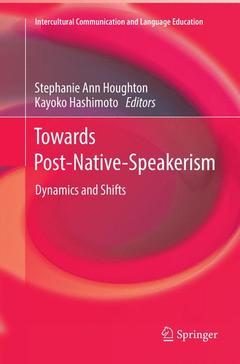Description
Towards Post-Native-Speakerism, 1st ed. 2018
Dynamics and Shifts
Intercultural Communication and Language Education Series
Coordinators: Houghton Stephanie Ann, Hashimoto Kayoko
Language: English
Subject for Towards Post-Native-Speakerism:
Publication date: 12-2018
Support: Print on demand
Publication date: 01-2018
Support: Print on demand
Description
/li>Contents
/li>Biography
/li>Comment
/li>
This book probes for a post-native-speakerist future. It explores the nature of (English and Japanese) native-speakerism in the Japanese context, and possible grounds on which language teachers could be employed if native-speakerism is rejected (i.e., what are the language teachers of the future expected to do, and be, in practice?). It reveals the problems presented by the native-speaker model in foreign language education by exploring individual teacher-researcher narratives related to workplace experience and language-based inclusion/exclusion, as well as Japanese native-speakerism in the teaching of Japanese as a foreign language. It then seeks solutions to the problems by examining the concept of post-native-speakerism in relation to multilingual perspectives and globalisation generally, with a specific focus on education.




